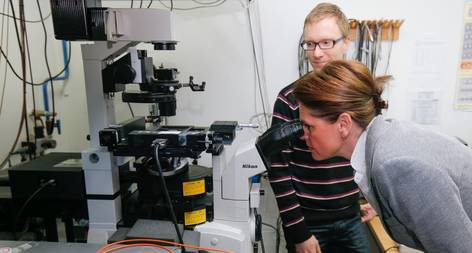NEWS
Prime Minister of the Republic of Slovenia, Alenka Bratušek, at Jožef Stefan Institute: "It is a priority to connect the Slovenian economy with the sphere of science."
Today, the Prime Minister of the Republic of Slovenia, Alenka Bratušek, together with the Minister of Education, Science and Sports, Jernej Pikalo, visited Jožef Stefan Institute (IJS) in Ljubljana, where she met with the institute's management and was given a tour of two laboratories. During their talks with IJS Director Jadran Lenarčič, who gave a brief presentation of the institute's activities and their most pressing problems, Prime Minister said that she is well aware of the difficult situation faced by the institute and its staff. "The fact is that under the current legislation institutions are not able to work for commercial purposes. However, a priority that must be followed at this moment is in the first place how to strengthen cooperation between the economic sphere and research institutions. The Government will investigate all the possibilities of establishing mutual connections between all stakeholders," pointed out the Prime Minister in her talks with the institute's management.
The participants also discussed the difficulties faced by young scientists, particularly in view of new PhDs, as in this year the title will be for the first time received by graduates of the new as well as the old education programmes, however, the majority of them will not be able to find employment despite their high qualification. Further to this, Minister Pikalo also expressed his readiness to look for additional financial support for at least part of these promising human resources, whose top expertise may significantly contribute towards faster development of the Slovenian economy and scientific sphere. The Prime Minister agreed that, otherwise, the majority of young PhD holders may seek their career opportunities abroad, which the Government should definitely prevent by enabling them to stay and work in Slovenia.
The institute's management further presented some of their successes that date back to the first period of their operations. Among other things, they are considered pioneers in the field of robotics on a global scale, while the latest major scientific accomplishment is the discovery of micro-laser, which also bears global significance since it was the first of the type in the world. In recent years, the cooperation between the Slovenian industry and the institute has intensified, which – in addition to projects financed from EU resources – represents yet another source of the institute's income.




